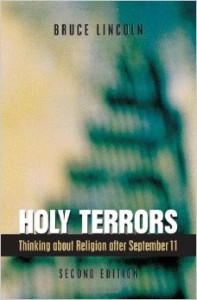
For a new Culture on the Edge series “You Are What You Read” we’re asking each member to answer a series of questions about books—either academic or non-academic—that have been important or influential on us.
2. Name one of your favorite theory books.
 Bruce Lincoln, Holy Terrors: Thinking About Religion After 9/11 (Chicago: University of Chicago Press, 2003)
Bruce Lincoln, Holy Terrors: Thinking About Religion After 9/11 (Chicago: University of Chicago Press, 2003)
This is one of my favorite theory books because of its approach toward and definition of religion. The definition, which has four parts, revolves around the first component: the foundation of religion, Lincoln asserts, is discourse. What makes religious discourse different from other types of discourse is that it appeals to a transcendent source (the most familiar version of which is “God”), which subsequently sets that claim beyond effective human critique significantly increasing the political weight of such claims. The other three components (practices, communities, and institutions) come to life only insomuch as they are socio-structural manifestations of that discourse.
This type of definition alone might be read as a rather sterile, detached, reductionistic perspective on religion that completely bypasses the manner in which most religious people would describe themselves. If you think that, Lincoln is ready for you. After defining religion, the remainder of the book is a careful treatment of everything from the instructions given to the 9/11 hijackers to a careful rhetorical comparison of the speeches of Osama Bin Ladin and George W. Bush in the immediate days after the attacks. It is part definition of religion, part overview of the politics of extremism, and part critique of the category “fundamentalism.” In the face of a myriad of voices who proclaimed 9/11 an aberration or twisting of religion, Lincoln is ready and willing to make the case that 9/11 was a thoroughly religious act, and even though an extraordinary one by comparison, a rather mundane one at the same time in the way that it followed rather predictable cultural patterns.
Admittedly, Lincoln’s model of religion is not entirely novel, but this particular volume has been helpful to me in the sense that it provides a “one stop shopping” experience for describing how religion works. To Lincoln, religion is imminently social. While he abstains from overly simplistic connections between religion and any specific social phenomena, his contextualization of religion as absolutely inseparable from culture is key to the importance of this book, as is his insistence that there is no good or positive essence that comprises religion. Religion is a series of strategic discourses that produce an authoritative effect, and depending on who you are in that power continuum determines whether you will regard it as good or bad.
